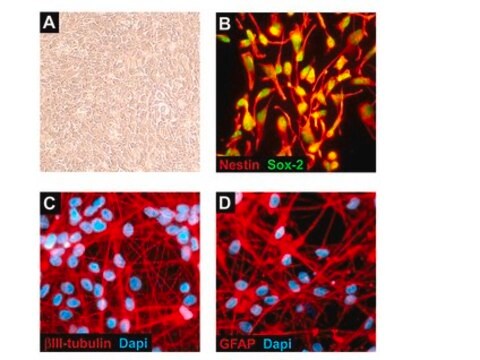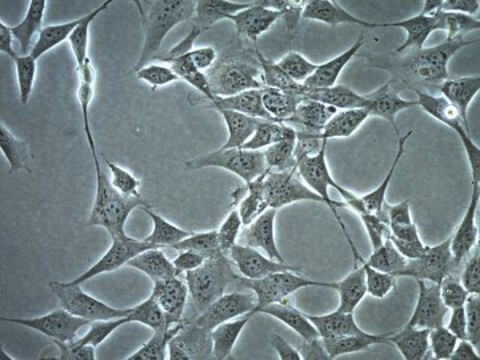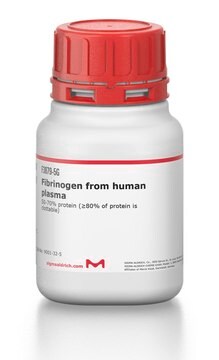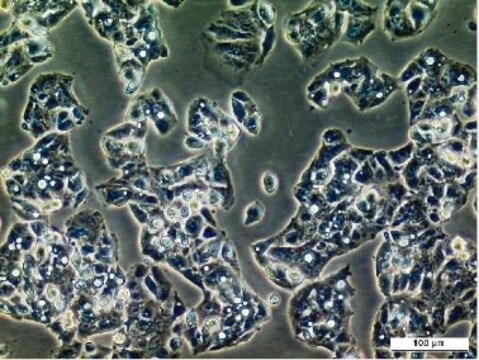PC-12 Cell Line from rat
88022401, rat adrenal gland (phaeochromocytoma), Not specified
Synonym(e):
PC12 Cells
Anmeldenzur Ansicht organisationsspezifischer und vertraglich vereinbarter Preise
Alle Fotos(1)
About This Item
UNSPSC-Code:
41106514
eCl@ss:
32190102
Empfohlene Produkte
Produktbezeichnung
PC-12 Cell Line from rat, from rat adrenal gland(phaeochromocytoma), 88022401
Biologische Quelle
rat adrenal gland (phaeochromocytoma)
Wachstumsmodus
Suspension
Karyotyp
Not specified
Morphologie
Not specified
Produkte
Catecholamine, dopamine and NPP
Rezeptoren
Not specified
Methode(n)
cell culture | mammalian: suitable
Relevante Krankheit(en)
cancer
Versandbedingung
dry ice
Lagertemp.
−196°C
Ursprung der Zelllinie
Rat adrenal phaeochromocytoma
Beschreibung der Zelllinie
Derived from a transplantable rat adrenal phaeochromocytoma. Respond reversibly to nerve growth factor by induction of neuronal phenotype. Cells synthesise and store catecholamine, dopamine and NPP. Used in neurobiological and neurochemical studies. When cells are grown with collagen - neuronal fibroblasts; without collagen - spherical clusters. PLEASE NOTE: Growing orders of PC-12 despatched from ECACC are grown without collagen and therefore the cells will be in suspension on receipt.
Anwendung
Neurobiological and neurochemical studies
PC-12 cell line from rat has been used to create artificial nervous system tissue models to study neurodegeneration. It has also been used to perform cell contact assay to test the biocompatibility of high-density electrode arrays.
Nährmedium
RPMI 1640 + 2mM Glutamine + 10% Horse Serum + 5% Foetal Bovine Serum (FBS)
Subkultur-Routine
Cells grow in small clusters but adhere poorly to plastic. The cells do grow satisfactorily in suspension in untreated flasks. Maintain cultures between 2-5x100,000 cells/ml: 5% CO2; 37°C. For attachment grow in collagen coated flasks (must be collagen type IV), feed 3 times a week and split cultures 1:3 to 1:6 (i.e. seeding at 2-4 x 10,000 cells / cm2) using 0.25% trypsin/EDTA; 5% CO2; 37°C. Growing cultures will be supplied in suspension. On receipt, incubate the flask overnight without opening and on introduction to a type IV collagen coated flask the cells should attach. Preparation of collagen solution: Use collagen type IV (Sigma C5533). Add 5mg collagen to 50ml 0.1M glacial acetic acid to obtain a 0.01% collagen solution. Stir at room temperature for 1-3 hours. Sterilise by transferring the solution to a screw capped glass bottle and carefully adding an aliquot of chloroform which will form a layer beneath the collagen solution. The volume of chloroform should be approximately 10% that of collagen. After overnight incubation at 4C aseptically remove the top layer of collagen and store in sterile tubes or flasks at 4oC. NB: Growth factor reduced matrigel may also be used. Preparation of flasks: Add sufficient collagen to cover the surface of the required number of tissue culture flasks and leave for at least 6 hours at 37°C. Remove excess fluid and allow flasks to dry by incubating at 37°C, leaving the caps loose. Prior to addition of cells wash flask three times in PBS. Flasks can be purchased from suppliers pre-coated with type IV collagen. Reported doubling time = 92 hours
Sonstige Hinweise
Additional freight & handling charges may be applicable for Asia-Pacific shipments. Please check with your local Customer Service representative for more information.
Hier finden Sie alle aktuellen Versionen:
Analysenzertifikate (COA)
Lot/Batch Number
Leider sind derzeit keine COAs für dieses Produkt online verfügbar.
Wenn Sie Hilfe benötigen, wenden Sie sich bitte an Kundensupport
Besitzen Sie dieses Produkt bereits?
In der Dokumentenbibliothek finden Sie die Dokumentation zu den Produkten, die Sie kürzlich erworben haben.
Unser Team von Wissenschaftlern verfügt über Erfahrung in allen Forschungsbereichen einschließlich Life Science, Materialwissenschaften, chemischer Synthese, Chromatographie, Analytik und vielen mehr..
Setzen Sie sich mit dem technischen Dienst in Verbindung.






